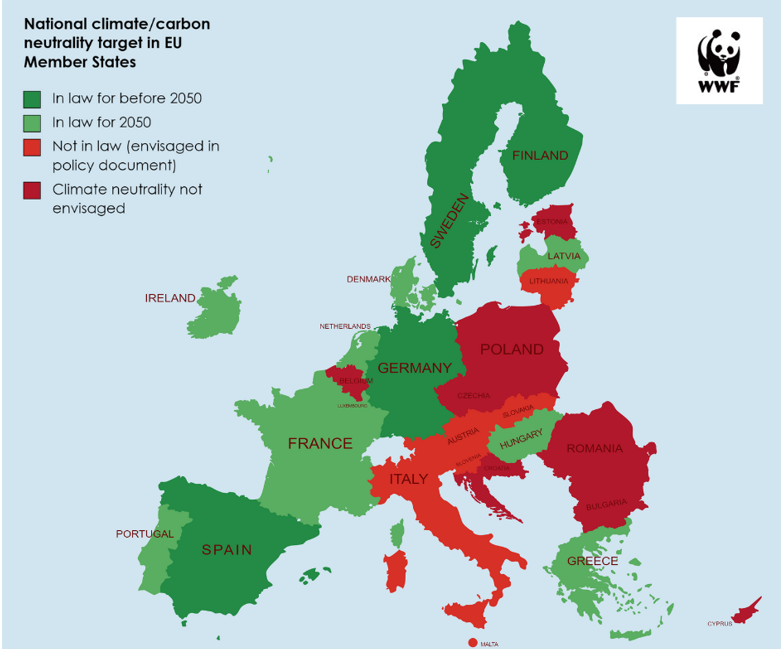With the new IPCC report1 having been launched, WWF stresses that CEE governments have no more time left to linger behind narrow energy security narratives and must speed up action to enable an economy-wide approach towards decarbonization, fixing the unsustainable energy, industrial and food systems that are leading us to climate disaster.
The report, concentrating primarily on mitigation, reducing greenhouse gas (GHG) emissions and removing carbon dioxide (CO2) from the atmosphere, provides clear guidance in this regard, drawing from the most recent scientific evidence. Preventing the worst impacts of climate change requires limiting global temperature rise to 1.5°C and despite the fact that, as the report shows, annual rate of GHG emissions growth declined from an average of 2.1% between 2000 and 2009 to 1.3% between 2010 and 2019, efforts remain far behind the needed reductions for preventing the worst impacts of climate change.
-
National policy actions, such as ambitious revisions of Long-term strategies (LTS) and National Climate and Energy Plans (NECP) are needed to reflect the urgency and gravity of the scientific findings. Adopting new or revising all national climate laws to legally mandate decarbonization is on the agenda in Member States like Bulgaria, and must be encouraged by the EU "Fit for 55" Package Effort Sharing Regulation revision2.
-
The ongoing negotiations on the European Commission proposed Fit for 55 package should include amendments for conditioning financial support for decarbonization, such as funds available from the future Social Climate Fund, to the existence of a national climate neutrality target and subsequent adequate planning of sectoral decarbonization.
-
Science aligned and model-based sectoral decarbonization pathways should be developed for all CEE member states and integrated into the NECP and LTS planning documents3.
 |
| © WWF-EPO |
The IPCC report is also clear on the fact that there is no more room for new fossil fuels infrastructure and that a mix of approaches is needed to avoid locking in CO2 emissions, including canceling new projects and switching to lower-carbon fuels.
Although CEE countries have committed to coal phase out dates in their newly adopted National Resilience and Recovery Plans (NRRPs), Romania and Bulgaria are still to develop implementation plans on the process to do so. Furthermore, planned conversions of coal power plants to use gas as main fuel would only lock in new fossil fuels infrastructure and should be abandoned by governments. At the same time, the European Commission must not continue granting derogations to CEE countries for climate funds, which currently allow for retrofitting of coal power plants and switching to gas, such as is the case of investments included in the Romanian NRRP.
Furthermore, the report emphasizes the urgent need to achieve transformation across all sectors. This requires scaling up renewable energy in CEE and having clear pathways for offshore wind and solar power development. Such pathways should prioritize roof-top solar panels, the use of brownfields, integrated multi spatial planning, development of adequate financial public and private support schemes, as well as efficientization of permitting procedures, including increasing staff capacity in relevant authorities.
In the rush for increasing their share of renewables, CEE countries need to hold back from incentivizing further the use of forest biomass for electricity generation, given the still week sustainability criteria applicable to the sector4, which WWF-CEE is advocating to be improved, and from wrongly justifying the construction or finalization of hydropower plants in protected areas as a solution, as is the case with the recent legislative changes5 in Romania that WWF has been contesting.
Transformation of the building sector comes at the top of priorities as well when talking about sectoral transformation. Developing comprehensive national policies in CEE member states, to match the ambition of the revised Energy Performance in Buildings Directive, and the EU Renovation wave, transforming fossil fuel-based district heating systems, and addressing CEE-specific concerns about energy poverty and just energy transition for vulnerable households.
Finally, the IPCC finds that protecting, restoring and sustainably managing carbon-rich ecosystems like forests and peatlands, as well as reducing the GHG intensity of food production and consumption, can mitigate 8-14 GtCO2e per year from now through 2050. In this respect, CEE countries must realize the potential of the Green Heart of Europe for restoring carbon absorbing forest and freshwater ecosystems and pioneering nature-based solutions for adaptation to climate change in rural and urban areas.
Climate & Infrastructure Regional Lead


